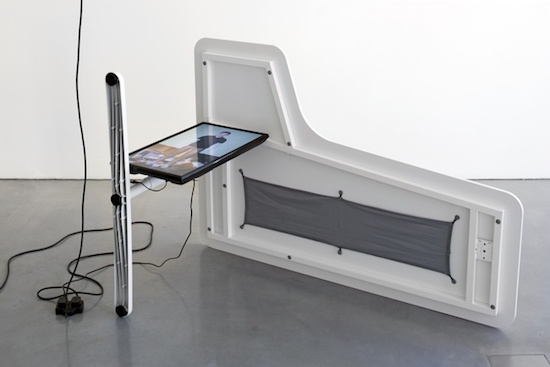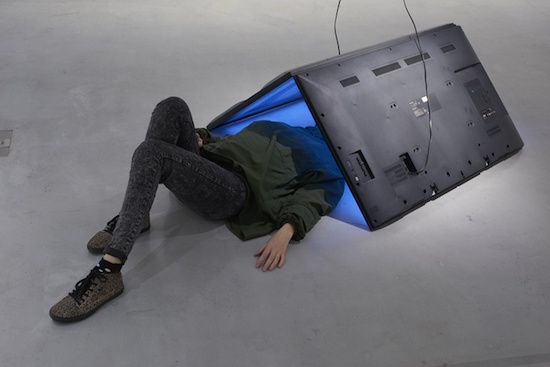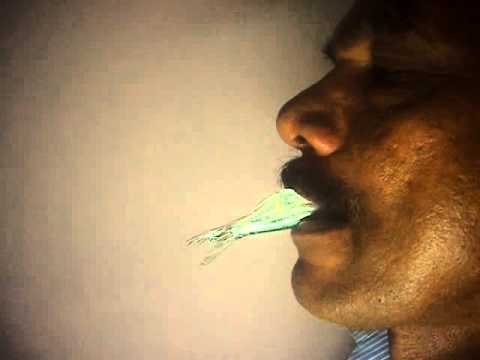I’m watching a succession of videos, each showing men, standing in their pants with dead fish variously tied, strapped, or taped to their naked bellies. With expressions betraying a mixture of bewilderment, high seriousness, and even pleasure (…?!) the videos show each man in turn delicately pouring liquid – usually water, but sometimes a can of Coke, or even Tennents Super – into the mouths of their fish. The videos are generally handheld, lo-res. One man is using a teated baby bottle to feed his piscine pal.
This is just one of the weird and wonderful films filling the backroom of Eva and Franco Mattes’s current show at Carroll/Fletcher in London. To make By Everyone For No One Every Day (BEFNOED)(2013–15), the artists crowdsourced ordinary folks from around the world to carry out their bizarre instructions through websites like Amazon Mechanical Turk. Having received and collated their microwork assignments, the edited videos were then uploaded to obscure or forgotten social media networks.
So, for instance, one of these collages, framed by the screen layout of the Chinese video hosting service Youku (slogan: “The world is watching”), we see a parade of people sitting on the floors of their homes covered by a blanket, with just their feet poking out at the bottom. In another, we see different men and women licking the wheel rims of a series of parked cars. Another, collages men half-submerged in water, with buckets on their heads, holding a drink in one hand, and giving a salute to the camera with the other.
But the thing that raises the Matteses installation above the level of a memeable internet prank is the arrangement of the screens themselves. Visitors to Carroll/Fletcher’s Fitzrovia gallery will have to contort and discomfort themselves almost as much as the people in the films. Two monitors are tented together on the floor in a triangle such that anyone wanting to watch would have to lie down on the floor and slide themselves, tentatively, underneath. One is positioned at about knee height facing the wall, with only about a foot’s length gap for watchers to squeeze into and then squat down behind to watch the film. There’s even one some seven foot off the floor, facing up – so only a giant, or maybe two friends hoisting each other, could possibly catch a glimpse of it.
“When looking at something, being it a newspaper or TV or YouTube, I sometimes ask myself what’s missing, what’s not there?” Eva and Franco Mattes said in a recent interview with Abandon Normal Devices. “It’s a good way to start defining the boundaries of a given system, its limitations, and of course the next question is, why is this thing missing? Who removed it? Often what’s missing is more important than what’s present.”
It’s this line of questioning that led them to the other major project on show at Carroll/Fletcher. Dark Content deals with content moderation. It’s an old saw that the world wide web is a place where self-expression is unfettered, and communication unmediated. Nothing could be further from the truth. Sites like Google and Facebook employ a small army of content moderators, globally dispersed and mostly low-paid. But in order to maintain the illusion of unfiltered content, today’s censors – unlike, say, the the director of the British Board of Film Classification, whose signature you will see at the start of every movie screening – are totally anonymous.
Eva and Franco Mattes interviewed several of these secret redactors. But in order to maintain the anonymity both they and their employers insist upon, they have further redacted the interviews themselves by giving them to stock avatars and computer-generated voices to parrot in the the films that fill most of the front rooms of the gallery. So you have these jerkily animated stock images of smiling young professionals talking about their work removing videos of beheadings from YouTube. The effect is decidedly uncanny.

“Content moderation is not a form of censorship,” one of their interviewees insists, “as these platforms have a right to maintain a safe environment, just like any bricks and mortar establishment.” But the assurances of this mod are undercut somewhat by the very next interviewee who talks about removing videos of 9/11 conspiracy documentaries or films critical of Scientology. “During the 2012 elections,” s/he says, “we were asked to remove all Al Qaeda-related content.” This instruction, apparently, came straight from ‘the top’. Another interviewee recalls a conservative line manager who would twist the moderation guidelines in order to encourage their employees to remove videos of Sarah Palin’s gaffes during the same 2012 presidential election campaign.
“Most of the content moderators work from their cubicles or apartments in the Philippines, Arizona or Bulgaria,” Eva and Franco Mattes say in the interview mentioned above, “miles away from the anonymous companies that hire them. Understandably, they wanted to remain completely anonymous. We tried many different ways to get in touch, until, after several months, we decided to try posing as a company ourselves, using the same services the big companies employ to anonymously crowd-source content moderators, and that worked out.
“In the videos the workers faces keep changing while the voice remains the same because, even after interviewing them, we have no idea about their age, gender, ethnicity etc.”
After watching all the interviews, the story that stuck with me didn’t involve any content being removed at all. “I once saw a video of a fast food employee spitting in food,” it begins. “There were no faces visible and the video was anonymous so we left it up. However…” The moderator recalled just one identifying mark on the expectorating burger-flipper. A tattoo on the wrist of two small blue birds. A little while later, the moderator in question was out getting something to eat with friends. As the server handed over their food, they noticed, on the girls wrist, that same tattoo with the two little blue birds. “… we didn’t eat the food.”
Eva and Franco Mattes, Abuse Standards Violations, is at Carroll/Fletcher. Today is the last day – so run, quick! Get down there




